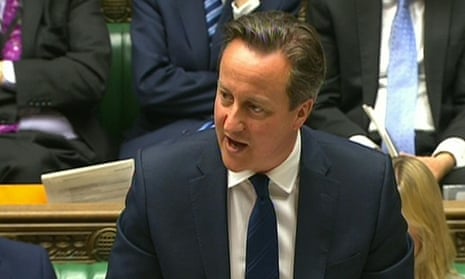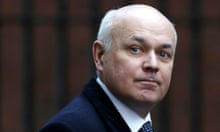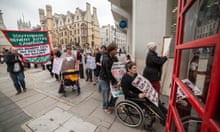David Cameron has declined to rule out cuts to disability benefits as part of George Osborne’s planned £12bn welfare savings to be outlined this year.
The prime minister, who confirmed to MPs that he stood by his commitment during the election campaign to maintain child benefit in its current form for the next five years, failed to give a similar commitment on disability payments.
Government sources suggested that the prime minister chose his words with care to appease Iain Duncan Smith, who was angered when the prime minister ruled out any changes to child benefit earlier in the week.
The work and pensions secretary believes that restricting child benefit, which could save £1bn a year, could help Osborne achieve his cuts rather than “cheese paring” all benefits. Downing Street has now ruled this out and is also understood to be wary of cutting disability benefits, possibly by taxing disability benefits.
This means the burden of welfare cuts may have to focus on tax credits and housing benefit, which help low paid workers. But government sources said they would no longer give a “running commentary” on possible welfare cuts ahead of the budget to avoid binding ministers’ hands.
The focus turned to disability benefits when Stephen Timms, the former Labour Treasury minister, challenged the prime minister to repeat on the floor of the Commons the commitments he made on disability benefits during the election.
The Conservatives were forced during the election campaign to deny they had plans to cut disability benefits after an internal Department for Work and Pensions document, which included proposals for a series of welfare cuts, was leaked to the BBC.
The emails suggested that civil servants, acting on instructions from the Conservatives, had drawn up proposals to tax disability benefits, saving £1.5bn a year. The BBC reported that civil servants were examining the possibility that disability living allowance, personal independence payments and attendance allowance (paid to pensioners over the age of 65 who have personal care needs) would no longer be paid tax free.
The emails also suggested restricting child benefit to the first two children and scrapping industrial injuries benefit by forcing firms to cover the costs.
Timms said: “I welcome the prime minister’s confirmation that there will be no cuts in the rates of, or eligibility conditions, for child benefit. Will he also confirm the commitment he made during the election that there will be no cuts in the benefits paid for disabled people?”
The prime minister declined to answer Timms’s question and instead reminisced about their encounter on the election trail.
Cameron told Timms: “What we have actually done is increase the benefits paid to disabled people by bringing in the personal independence payment which is actually more generous to those who are most disabled. Can I say how much I enjoyed meeting with him during the general election where we both addressed the Festival of Life in the Excel centre in his constituency. I don’t know about him, but it’s certainly the only time I’ve spoken to 45,000 people in my life.”
Cameron’s spokesman said: “The prime minister pointed out that we have actually increased disability payments. In terms of the £12bn, we will be spelling out our plans. But we always operate on the very clear principle about protecting the most vulnerable, ensuring that work always pays.
“That is the approach we have taken throughout. Look at our track record over the last five years where we have introduced systems where people with the most severe disabilities, as the prime minister said in the commons, money towards those has increased.”
The spokesman was asked about the prime minister’s equivocal response to Timms, compared with the emphatic response by Iain Duncan Smith, the work and pensions secretary, to the leak to the BBC in March.
A spokeswoman for Duncan Smith said at the time: “This is ill-informed and inaccurate speculation. Officials spend a lot of time generating proposals – many not commissioned by politicians. It’s wrong and misleading to suggest that any of this is part of our plan.”
The No 10 spokesman said: “We made very clear, when they emerged, that those had been looked at in 2013 and rejected at the time. The prime minister was very clear on that.”







Comments (…)
Sign in or create your Guardian account to join the discussion